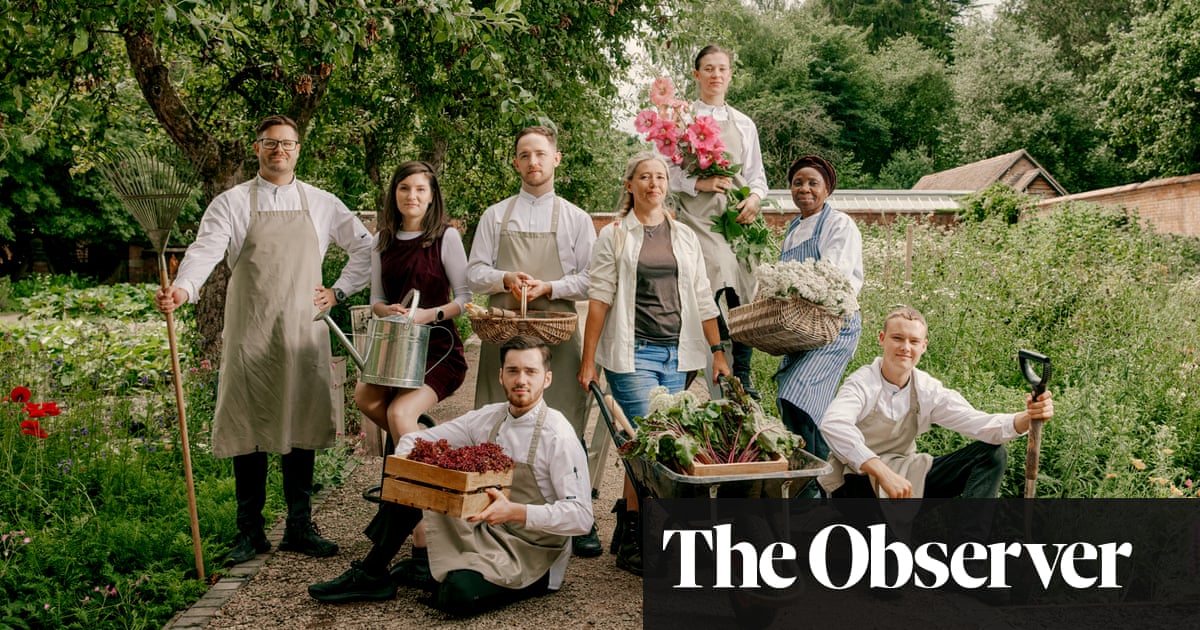
Hampton Manor, Warwickshire
A nook of a walled garden supplying produce at its peak freshness to the on-site restaurant
“It’s like a ballet,” says Lou Nicholls, Hampton Manor’s head gardener, referring to how just before dinner Grace & Savour’s chefs fan out across her walled garden to pick edible flowers with tweezers. “You have to do it very delicately,” she says.
Appointed in March, Nicholls is now talking every day “to people who cook with plants I grow”. She is enjoying growing the “most tasty” varieties of vegetables she can find and, as those sakura tomatoes or high-quality F1 varieties of yellow French beans come into season, teaching Grace & Savour’s chefs how best to harvest them.
Not everyone knows to snip herbs with scissors (to prevent damage to the plant), to tear rather than cut the leaves off beetroot (stops “bleeding”, keeps them moist) or that if you harvest a lettuce’s lower leaves, not the head, it can be repeatedly cropped. It helps that Grace & Savour’s chef-director, David Taylor, takes a similar approach, knowing the optimum time to pick salad leaves (morning, when it’s cooler) or ripe soft fruit (sunny afternoons, when the flesh is at its softest and sweetest). “It makes a big difference,” he insists.
The walled garden – a half-acre nook within a 45-acre estate – can only provide a ballpark 10-15% of Taylor’s fresh summer produce. But this ability to pick produce as little as 30 minutes before service, presenting it at absolute peak freshness, is fundamental to dishes such his grazing plate of seasonal fruits, sprayed with cherry blossom syrup; a snack of greens, flowers and goat’s curd; or a dish of sweetcorn, girolles and thyme in a miso chicken butter emulsion.
If he uses up the garden’s supply, Taylor will source replacement ingredients from trusted producers. But even then, he says: “If you want something, you can’t necessarily get it. Our standpoint is to react to nature. Last year, we only had strawberries for two weeks. The farm we wanted to work with lost their crop due to the sun.”
Most restaurants would simply change supplier but that’s not possible here. Encouraged by the Hill family, who run the estate and its luxury Manor House hotel, Taylor is a stickler on sustainability and chooses suppliers accordingly. It is a painstaking process and they are not easily replaced.
Nicholls, a trained organic gardener, is equally careful, making her own compost, using bio-controls if necessary: when aphids attack, buy ladybirds! She is a so-called “no dig” gardener, which means letting compost and grass clippings rot down naturally atop the soil, with minimal digging, to maximise its health.
Taylor is well aware how unique his situation is. He runs a 28-cover, £155-a-head tasting-menu restaurant built into a walled garden and won a Michelin star a year after opening. He can be fastidious in a way large restaurants cannot, though he has no desire to lecture anybody. The “authentic position”, he says, is that no restaurant is perfect on sustainability. “The complexities of it are very difficult.”
That said, he wants Grace & Savour’s ethos to resonate outside its small, wealthy audience. Taylor used to work at Oslo’s Maaemo, a three-Michelin-starred restaurant. In his view, its support for artisan Norwegian producers such as Nýr soft cheese, or the organic dairy Rørosmeieriet, helped propel them to national recognition. “You can have an impact,” he says. “You can’t save the world. But don’t use it as an excuse not to keep trying.”
The Deptford Little Farm, south-east London
Urban permaculture farming for a group of London pubs
“I love cities: the buzz, the energy, the people,” says Nico Tréguer. But arriving in London in 2005, this French entrepreneur was taken aback at the capital’s “lack of contact with where food was coming from”.
Itching to address that disconnect, in 2014 Tréguer and his business partner, architect Gareth Roberts, created Spitalfields gastropub the Culpeper. Its USP is a rooftop kitchen garden where guests can eat plates of fennel and mint salad, pickled radishes or mackerel and crispy kale, which use vegetables grown around them.
Rare free space in cities, rooftops are excellent for growing. “They’re sheltered, have a lot of sun and heat from the building, and are controlled in terms of pests and disease,” says Jack Astbury whose company, Urban Organic, designed and tends the Culpeper garden. “You build an ecosystem up there, slugs and snails, but the pressure is less.”
That lack of pests is important as the Culpeper doesn’t use pesticides or artificial fertilisers. Compost is created from food waste on-site. The Culpeper and the three other pubs owned by Roberts and Tréguer, including the certified organic Duke of Cambridge, support regenerative farming, says Tréguer, food producers operating sustainably to “replenish soil quality”.
The Culpeper’s chefs are encouraged to get involved in the garden. According to Peter Weeden, the Culpeper Family Hospitality Group’s chef-director, cultivating herbs, salad leaves and beetroot helps chefs “really value” ingredients and attracts those who want to work with fresh produce. For Weeden, the garden is “pretty and interactive” but “not window-dressing”.
Although it contributes a financially negligible amount of the pub’s total ingredients – “Less than 1%,” says Tréguer – the rooftop garden adds value in more abstract ways: wellbeing, food quality, feel. “It’s inspiration,” he says.
This summer will see the first harvests from Tréguer and Roberts’s new project in south-east London, the Deptford Little Farm. Located next to another of their businesses, a development of eco-friendly homes, this 3,500 sq ft plot could supply 5% of the four pubs’ fresh produce by 2025. “I can’t guarantee that number,” says Tréguer. “But it’s starting to be tangible.”
The farm follows permaculture principles where food-producing land is layered with trees, shrubs and plants to mimic wildlife-friendly habitats. Oyster mushrooms grow in hedge shade. In choosing what to grow in Deptford, Astbury focused on varieties that are “big on flavour”, such as Thai basil, crookneck squash or castelfranco radicchio, with a complementary emphasis on more expensive to buy ingredients such as edible flowers, or harder to find items such as agretti (monk’s beard). The latter garnishes a dish of burrata and zephyr courgettes at the Duke of Cambridge.
Part of community-interest company Ethical Land, the Deptford farm is intended to be the first of several not-for-profit urban gardens that, supported financially by supplying the pubs, will engage schools and community groups in green techniques, such as rainwater irrigation or the soil-enriching use of perennial herbs and fruit trees. Urban gardens “act as beacons in a concrete jungle”, says Astbury.
The Free Company, Balerno, Scotland
A family dairy farm transformed into a regenerative market garden
In summer, some students head to Ibiza or Cornwall. Not Charlie Buchanan-Smith. As a 20-year-old, he spent summer 2015 in rural Hawarden and Weston-under-Redcastle, cooking on farms with a nomadic pop-up called Enroot. Co-founded by Charlie’s brother, Angus, and chef DeVonn Francis, it was an attempt to connect people to food producers in each location, creating a restaurant featuring local ingredients and the people responsible for them.
It was a personal mission for the Buchanan-Smith brothers, who had witnessed the end of dairy farming on their family’s land near Edinburgh due to falling milk prices. “This was happening to a small dairy farm every week,” says Charlie, who sees the loss of jobs, knowledge and “cultural heritage” as a massive problem.
Energised by Enroot, the brothers persuaded their family to lease them the 170-acre Cockdurno Farm. They became the fourth-generation to farm here and, in 2017, opened a restaurant on-site.
Renamed The Free Company (TFC), the farm’s market garden and rare-breed livestock are managed on regenerative farming principles. A formal process of organic certification is under way for everything except TFC’s pigs, whose feed is sometimes sustainably supplemented with spent grains from Leith’s Newbarns Brewery. Produce is sold in vegetable- and meat-box schemes via an online shop and into top Edinburgh restaurants such as Heron and Timberyard.
It is also showcased in the farm’s novel restaurant, housed in a former cowshed, which serves a seasonal six-course menu to 75 people on a “pay what you think it’s worth” basis. (According to Charlie, 95% of people pay the guideline £50-£60 plus £10 deposit.) The unusual pricing is both a marketing ploy and, like the pre-meal explanation of how TFC differs from a conventional farm, intended to provoke debate about the real value of food, and farms’ ability to grow sustainable produce and make that pay.
“Everyone should have access to an organically grown, sustainable diet, which isn’t possible – people are struggling to feed themselves while food prices are, fundamentally, far below their true value,” says Charlie.
While the brothers debate food policy (their grandfather, Alick Buchanan-Smith, was the agriculture, food and fisheries minister from 1979 to 1983), it is chef Craig Turner’s job to make the persuasive, flavour-based case for TFC. He does so in dishes of carlin pea hummus or a warm salad of confit baby fennel, courgette puree, green garlic and blitzed pork crackling. Using “shoots, baby bulbs and fully grown” vegetables harvested that morning on-site is a “privilege not many chefs get”, says Turner. Inspired by these heightened flavours, his cooking has become simpler: “Cutting back on processes, letting the product speak for itself.”
If that sounds idyllic, Turner’s role requires constant improvisation, as ingredients peak early, late or, occasionally, not at all. His mains, such as his summer hogget dish, are designed to work with various vegetables – smoked potatoes, carrot puree and greens – as the season evolves. “You roll with the punches,” he says. “You can’t be negative. From challenges, you may find something exceptional. It’s nature. Nobody can truly control that.”
Cinderwood Market Garden, Cheshire
Pesticide-free heritage produce grown for local restaurants
Chef Joseph Otway is constantly telling his kitchen staff at Higher Ground, his restaurant in Manchester, to “embrace the chaos”. It is an unusual rallying cry from a place that only months after opening was voted 51st in the top 100 at the 2023 National Restaurant Awards.
Traditionally, talented chefs have craved order and consistency in pursuit of perfection and accolades. As Otway creates plates of smoked beetroot and brill roe or salt-baked celeriac, bay and preserved blueberries, his focus, instead, is on using genuinely seasonal UK ingredients from small producers working sustainably. Unlike chefs used to next-day delivery of uniform produce, Otway is required to “turn on a dime” as his suppliers tell him what ingredients are in their prime that week. Chief among these suppliers is Cinderwood, the Cheshire market garden he and his Higher Ground cofounders, Richard Cossins and Daniel Craig Martin, run with grower Michael Fitzsimmons.
Opened in 2021, Cinderwood is a “meticulously planned” 1.5 acres where economically, says Fitzsimmons, the “fine margins” demand absolute efficiency. “If you figure something out that can save two minutes out of 10 – the way you pick, the tools, little time-and-motion things – it’s massive.” This is “no hippie approach where we cast a few seeds and see what comes up”.
But in cultivating flavour-packed heritage ingredients in an environment without pesticides or artificial fertilisers – “We have a lot of weeds,” says Fitzsimmons – he and Otway have chosen to grow in a way that throws up surprises: fleeting seasons, sudden gluts, wonky veg. “Disaster is a little bit baked into the process,” says Fitzsimmons. “Crop planning, we predict 30% loss – it’s looking more like 20% this year. We want to get to 10%. There are loads of variables: pest damage, too hot, too dry, too wet, too sunny. We’re growing as part of an ecosystem. Sometimes Mother Nature’s going to eat some of it.”
Higher Ground and its sister wine bar, Flawd, know what is coming in on Fitzsimmons’ twice-weekly deliveries but his vegetables, picked within 24 hours of delivery, routinely vary. Otway might order 10 celtuce (a lettuce prized for its thick stem), but it’s difficult to predict, says the chef, how much that will be in terms of weight or size. “Or there’s all the leaves on them we didn’t think about,” continues Otway. “So stems go on a fish dish as garnish and, OK, let’s use the leaves for caesar salad with oyster dressing. It’s a lot of rethinking things but it makes you a stronger, more dynamic cook.”
Otway was inspired to work in this way by the year he spent at Dan Barber’s Blue Hill restaurant, located at the sustainable farming research centre, Stone Barns, in New York State. The ingredients coming off the farm were, says Otway, “on a different level. You can’t un-taste that.”
But you can spread the message. If Higher Ground does so “subtly” – natural wines, namechecks for rare vegetable varieties but no overt evangelism – Cinderwood was opened to offer an alternative to traditional restaurant supply chains. It took time to persuade chefs that the benefits of using its unusually tasty, fresh atomic grape tomatoes, suyo cucumbers or crown prince squash outweighed its smaller product range and limited delivery schedule. But it now supplies about 15 hospitality businesses in the north. These days, says Otway, “I’m not even our biggest customer.”
“People are beginning to choose quality over convenience,” says Fitzsimmons, who wants chefs, “top-down trendsetters”, to catalyse consumer change. He wants to see shopping bags full of things farmed while prioritising soil health. “That happens to make things taste better,” he adds, “which is a bonus.”












